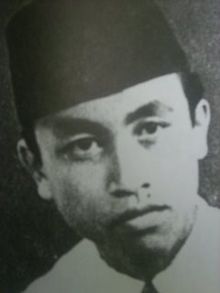Rosli Dhobie
| Rosli Dhoby | |
|---|---|

Rosli Dhobi (1932–1950)
|
|
| Born | 18 March 1932 Kampung Pulo, Sibu, Sarawak |
| Died | 2 March 1950 (aged 17) Kuching, Crown Colony of Sarawak |
| Burial place | Kuching Central Prison Cemetery, Kuching (1950-1996) Masjid An-Nur, Sibu (present location) |
Rosli Dhoby (18 March 1932 – 2 March 1950) was a Malay Sarawakian nationalist from Sibu, Sarawak, Malaysia during the British crown colony era in that state.
He was a member leader of the Rukun 13, an active organisation in the Anti-cession movement of Sarawak, along with Morshidi Sidek, Awang Rambli Bin Deli and Bujang Suntong. It was a secret cell organisation, composed of nationalists, which carried out assassinations of officers of the British Colonial government in Sarawak. He was well known for his assassination of Sir Duncan George Stewart, the second governor of colonial Sarawak, in 1949.
It has been reported that the group was in fact agitating for union with newly independent Indonesia. Documents released in the late 20th century indicate that the British Government knew this, but chose not to reveal the truth of the matter in the assassination so not to provoke Indonesia. It had recently won its war of independence from the Netherlands, and the UK was already dealing with the Malayan Emergency to the north-west.
Rosli Dhobi was born on 18 March 1932 in Kampung Pulo, Sibu, Sarawak and was the second child in the family. His father, Dhobi bin Buang, is said to be originated from Indonesia and a descendant of Raden. His mother, Habibah binti Haji Lamit was come from a family in Mukah. Little is known about his earlier life although friends regard Rosli as an approachable person despite his quietness. He had an eldest sister and a younger brother, Fatimah and Ainie.
Rosli started his career as a teacher and quit his job in 1947 to teach in Sibu People's School. Before that, he worked at the Sarawak Public Works Department and for Utusan Sarawak. Rosli was known to be a nationalist and a poet. Using the nickname Lidros, Rosli penned down a nationalistic poem titled 'Panggilan Mu yang Suchi' (Malay: "Your Divine Call") which was published in Utusan Sarawak on 28 February 1948. The usage of nicknames was prevalent at the time since the British Colonial Authority vigorously monitored any attempts to spread words against them. He joined the Sibu Malay Youth Movement (Malay: Pergerakan Pemuda Melayu Sibu) under the leadership of Sirat Haji Yaman.
...
Wikipedia
